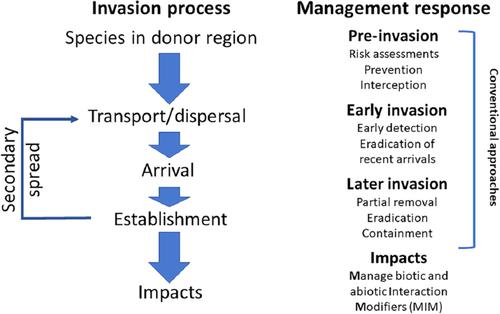当前位置:
X-MOL 学术
›
WIREs Water
›
论文详情
Our official English website, www.x-mol.net, welcomes your
feedback! (Note: you will need to create a separate account there.)
What to do when invaders are out of control?
WIREs Water ( IF 6.8 ) Pub Date : 2020-08-15 , DOI: 10.1002/wat2.1476 Jason B. Dunham 1 , Ivan Arismendi 2 , Christina Murphy 2 , Alex Koeberle 2, 3 , J. Andres Olivos 2 , James Pearson 2 , Francisco Pickens 2 , David Roon 2 , John Stevenson 2
WIREs Water ( IF 6.8 ) Pub Date : 2020-08-15 , DOI: 10.1002/wat2.1476 Jason B. Dunham 1 , Ivan Arismendi 2 , Christina Murphy 2 , Alex Koeberle 2, 3 , J. Andres Olivos 2 , James Pearson 2 , Francisco Pickens 2 , David Roon 2 , John Stevenson 2
Affiliation

|
Biological invasions threaten species and ecosystems worldwide. Impacts from invasions are especially prevalent in freshwaters, where managers have struggled to contain the problem. Conventional approaches to managing invaders focus on prevention and control. In practice, these measures have proven to be variably effective. Control or eradication of established invaders is particularly difficult and, even if ecologically feasible, it may not be socially desirable. Here we propose a new alternative to managing invasive species: managing impact modifiers (MIM). The MIM approach focuses on managing impacts, rather than controlling the invader directly. We reviewed the literature for the world's worst invasive fishes in freshwaters to show there is strong evidence to support the potential for MIM as an effective means of managing impacts of invasions. This included evidence pointing to characteristics of the environment or species themselves that modify impacts of invasions. Detail of three case studies reinforces the potential for MIM as a viable option. Although MIM appears promising, effective application could involve significant investment in an information gathering phase to identify impact modifiers and the means to manage them. Accordingly, MIM is best incorporated into management plans that include a strong learning or adaptive component. Ultimately, MIM may be one of the only viable alternatives for managing invasive species that are truly out of control.
中文翻译:

当入侵者失控时该怎么办?
生物入侵威胁着全世界的物种和生态系统。入侵造成的影响在淡水中尤为普遍,那里的管理人员努力控制这一问题。处理入侵者的常规方法侧重于预防和控制。在实践中,这些措施已被证明是有效的。控制或根除已建立的侵略者特别困难,即使在生态上可行,这在社会上也不可取。在这里,我们提出了一种管理入侵物种的新方法:管理影响修饰符(MIM)。MIM方法侧重于管理影响,而不是直接控制入侵者。我们回顾了世界文学 淡水中最恶劣的入侵鱼类,显示出有力的证据支持MIM作为管理入侵影响的有效手段的潜力。这包括表明改变入侵影响的环境或物种本身的特征的证据。三个案例研究的详细信息增强了MIM作为可行选择的潜力。尽管MIM看起来很有希望,但有效的应用程序可能需要在信息收集阶段进行大量投资,以识别影响因素和管理手段。因此,最好将MIM纳入包含强大学习或适应能力的管理计划中。最终,MIM可能是管理真正失控的入侵物种的唯一可行选择之一。这包括指出改变入侵影响的环境或物种本身的特征的证据。三个案例研究的详细信息增强了MIM作为可行选择的潜力。尽管MIM看起来很有希望,但有效的应用程序可能需要在信息收集阶段进行大量投资,以识别影响因素和管理手段。因此,最好将MIM纳入包含强大学习或适应能力的管理计划中。最终,MIM可能是管理真正失控的入侵物种的唯一可行选择之一。这包括指出改变入侵影响的环境或物种本身的特征的证据。三个案例研究的详细信息增强了MIM作为可行选择的潜力。尽管MIM看起来很有希望,但有效的应用程序可能需要在信息收集阶段进行大量投资,以识别影响因素和管理手段。因此,MIM最好合并到包含强大学习或适应性组件的管理计划中。最终,MIM可能是管理真正失控的入侵物种的唯一可行选择之一。有效的应用可能需要在信息收集阶段进行大量投资,以识别影响因素和管理手段。因此,MIM最好合并到包含强大学习或适应性组件的管理计划中。最终,MIM可能是管理真正失控的入侵物种的唯一可行选择之一。有效的应用可能需要在信息收集阶段进行大量投资,以识别影响因素和管理手段。因此,MIM最好合并到包含强大学习或适应性组件的管理计划中。最终,MIM可能是管理真正失控的入侵物种的唯一可行选择之一。
更新日期:2020-08-15
中文翻译:

当入侵者失控时该怎么办?
生物入侵威胁着全世界的物种和生态系统。入侵造成的影响在淡水中尤为普遍,那里的管理人员努力控制这一问题。处理入侵者的常规方法侧重于预防和控制。在实践中,这些措施已被证明是有效的。控制或根除已建立的侵略者特别困难,即使在生态上可行,这在社会上也不可取。在这里,我们提出了一种管理入侵物种的新方法:管理影响修饰符(MIM)。MIM方法侧重于管理影响,而不是直接控制入侵者。我们回顾了世界文学 淡水中最恶劣的入侵鱼类,显示出有力的证据支持MIM作为管理入侵影响的有效手段的潜力。这包括表明改变入侵影响的环境或物种本身的特征的证据。三个案例研究的详细信息增强了MIM作为可行选择的潜力。尽管MIM看起来很有希望,但有效的应用程序可能需要在信息收集阶段进行大量投资,以识别影响因素和管理手段。因此,最好将MIM纳入包含强大学习或适应能力的管理计划中。最终,MIM可能是管理真正失控的入侵物种的唯一可行选择之一。这包括指出改变入侵影响的环境或物种本身的特征的证据。三个案例研究的详细信息增强了MIM作为可行选择的潜力。尽管MIM看起来很有希望,但有效的应用程序可能需要在信息收集阶段进行大量投资,以识别影响因素和管理手段。因此,最好将MIM纳入包含强大学习或适应能力的管理计划中。最终,MIM可能是管理真正失控的入侵物种的唯一可行选择之一。这包括指出改变入侵影响的环境或物种本身的特征的证据。三个案例研究的详细信息增强了MIM作为可行选择的潜力。尽管MIM看起来很有希望,但有效的应用程序可能需要在信息收集阶段进行大量投资,以识别影响因素和管理手段。因此,MIM最好合并到包含强大学习或适应性组件的管理计划中。最终,MIM可能是管理真正失控的入侵物种的唯一可行选择之一。有效的应用可能需要在信息收集阶段进行大量投资,以识别影响因素和管理手段。因此,MIM最好合并到包含强大学习或适应性组件的管理计划中。最终,MIM可能是管理真正失控的入侵物种的唯一可行选择之一。有效的应用可能需要在信息收集阶段进行大量投资,以识别影响因素和管理手段。因此,MIM最好合并到包含强大学习或适应性组件的管理计划中。最终,MIM可能是管理真正失控的入侵物种的唯一可行选择之一。











































 京公网安备 11010802027423号
京公网安备 11010802027423号